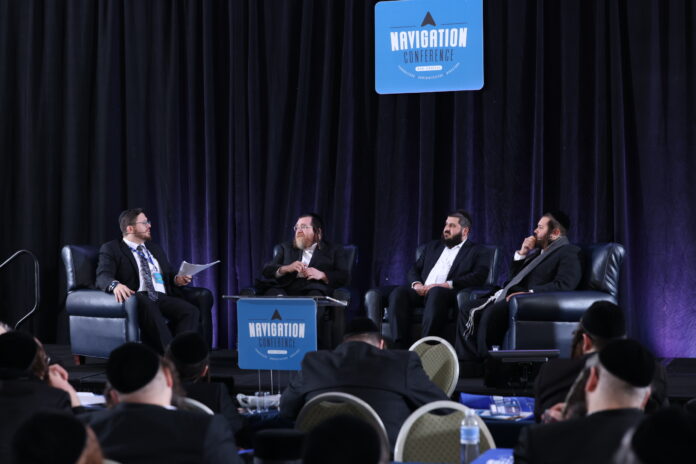Giving tzedakah is part of our identity. I would guess that every Jew encounters the opportunity to give tzedakah on a daily basis. Sometimes it’s in the form of the pushka box in shul, or it’s in an email or a text message from a family member raising funds for a beloved cause. Or maybe you get a knock on the door or an actual phone call. While we all want to give tzedakah to the best of our ability, it is fundraisers who have the “job” of helping the rest of us recognize the zechus we have in giving.
Fundraising is an art. There’s a thin line between a business selling their product or service and a fundraiser raising money for their organization. And there are lessons that the fundraising world and the business world can learn from each other.
Several weeks ago, I was invited by Shmiel Stern to host a unique panel at his Navigation Conference that took place in Tarrytown, New York. Attendees included more than 500 non-profit administrators and fundraisers seeking to advance their craft—and a difficult one it is. Most of us would rather do many other jobs than ask people for money. And yet people do it. I have found that it is an industry filled with many caring, altruistic individuals.
My three panelists each provided a unique perspective on fundraising. Rabbi Yoel Braver is a well-known fundraising educator in the chasidishe world. He oversees a team of fundraisers for Yetev Lev in Eretz Yisrael and helps craft the strategies needed to reach their goals. He also works with individuals and organizations.
Rabbi Mendy Kotlarsky, son of the famed Rabbi Moshe Kotlarksy, is a powerhouse in his own right. Aside from assisting his father in his duties at Merkos, the umbrella organization for Chabad shluchim across the globe, Mendy has started 16 mosdos of his own, including CTeen (the Chabad teen network), Chabad Young Professionals International (CYP), Chabad on Call (a medical support network), and many others.
And my third panelist? Well, if you have donated to a crowdfunding campaign at any point in the past several years, chances are that it was managed by Reb Shlome Zalmen Spitzer and his company The Omni Group. Reb Shlome Zalmen has run more than 250 successful Charidy-like campaigns, where he works hand-in-hand with non-profit organizations to guide them from A to Z.
While our free-flowing conversation certainly contained solid, ready-to-implement fundraising tips, I was most impressed by the motivation that our panelists bring to their work. Each of them sees raising funds as a higher calling—one they aspire to answer daily. Tizku l’mitzvos!
—Nesanel
Nesanel Gantz: The goal of attending a panel such as this one is to come away with one solid idea, one thing that will change your mosad, your fundraising, or at the very least, yourself. I urge everyone to write down the lessons they hear that they want to implement.
I’d like to welcome Rabbi Yoel Braver, Rabbi Mendy Kotlarsky and Reb Shlome Zalmen Spitzer to the stage. Reb Yoel, let’s begin with you. Tell us a bit about your background.
Yoel Braver: As a bachur, I was involved in different projects in yeshivah. The first real fundraising project I was involved in was for the mikvah in Williamsburg. It could be that the success I have today is because I didn’t make any money from the first few campaigns I was involved with. I was able to learn the ropes without that pressure of thinking about how much I was making.
Today, I am involved in the day-to-day fundraising at Yetev Lev. I have a team of fundraisers, and my job is to help them with their fundraising, in addition to the work that I do on my own.
Also, as online campaigns started taking off during the past several years, I started working on them behind the scenes. I work with individuals to help them succeed in their undertakings. I don’t do their fundraising myself; I guide them in doing it.
Nesanel: Reb Mendy, tell us about yourself.
Mendy Kotlarsky: I’m not a fundraiser. Baruch Hashem, I grew up in a house with a father [Rabbi Moshe Kotlarsky] who had the zechus to establish Chabad Houses across the world. In order to do that, he needed money, so fundraising was a byproduct of his work. I would say that the same is true for myself.
We have a goal to reach Jews everywhere and help them connect with Yiddishkeit. Over the last 30 to 40 years, we had to find people who appreciate what we do and were ready to support it. A central organization like Merkos can support many other mosdos across the world. That means that with an investment in a central place, you can impact 5,500 shluchim in over 110 countries. We started building projects that were needed for kids, for teenagers, for young professionals, for hospitals, and even for the shluchim themselves. These are people living alone in a country or community, with no real kehillah. Their kids are growing up without any frum friends. So every one of these shluchim really needs support. And in order to support them, you need to be able to fundraise.
Nesanel: Reb Mendy is a bit humble, so I’ll jump in here. He manages 16 mosdos that he founded himself, and he oversees an annual budget of millions of dollars.
Reb Shlome Zalman, your turn.
Shlome Zalmen Spitzer: I’m 25 years old. My first—
Nesanel: Notice the young guy is not afraid to say his age.
Shlome Zalmen Spitzer: It’s true [laughs]. I felt a pull towards fundraising from the time I was 14 years old. There was a Yid who is a famous nadvan of sefarim. I made an appointment with him on a Motzaei Shabbos and got $70,000 worth of sefarim. From then on, I was involved in different projects.
After my marriage and learning in kollel, I went to work for an organization that helps patients who have cancer. One patient passed away, a fund was needed, and I helped arrange an online campaign for his family. What I did at that time was primitive compared to what I do today, but baruch Hashem, we were successful. I helped several other campaigns too, and then a few years ago, I started my company, the Omni Group, which helps its client companies run successful online campaigns.
Nesanel: I speak a bit of English, but what does Omni mean?
Shlome Zalmen Spitzer: You’d have to Google it for the official definition, but “omni” is a word of shleimus. The idea is that we include everything to help a non-profit, from online campaigns to running the paperwork and the back office for smaller organizations.
Nesanel: Got it, like omniscient or omnipresent.
You do something unique when it comes to online campaigns. Anyone can call up one of these companies and launch an online campaign. But you help the company craft the strategy. You guide them through the entire process.
Shlome Zalmen Spitzer: Yes, that’s something I discovered with the first organization that I helped. Online campaigns feel like fun, but things get lost along the way. If you don’t have a full strategy in place, you won’t be successful. You have to understand who to target and who should raise what amount. We work directly with the organization and the fundraisers to help them with strategy so that they hit their goals. We are involved, on a personal level, every step of the way.
Nesanel: I understand that you also have quite a number of gvirim who entrust you with managing their tzedakah donations. Tell us about that.





















